Meet the Mask-Makers Who Sew With ‘Prayer in Motion’ in the Pandemic
Religious and lay Catholics live the call of faith as they help protect people from coronavirus.

Just as rosary beads help Dominican Sister Mary Catharine of Jesus Perry focus on praying the Rosary, sewing face masks for a local hospital reminds her to pray that the health-care workers who wear them will avoid contracting COVID-19.
“It’s very simple work; and at least for me, this has become a tangible way also to keep in mind praying for everyone really being affected by the virus: the people who are sick, the nurses, all the different health-care workers and their families,” said Sister Mary Catharine, 51, a member of the Dominican Monastery of Our Lady of the Rosary in Summit, New Jersey, where sisters have made as many as 500 masks since learning of the need for them in March.
Sewing face masks has become a worldwide cause, as the supply of manufactured masks hasn’t met demand from health-care institutions and others seeking protection from the pandemic. These masks can be washed and reused.
Religious such as Sister Mary Catharine and lay Catholics across the country talked about offering their time, skills and prayers in making masks for hospitals, nursing homes, their families and others. Citing their reasons making masks, they described their work and materials and how the activity has helped build community and affected them spiritually.
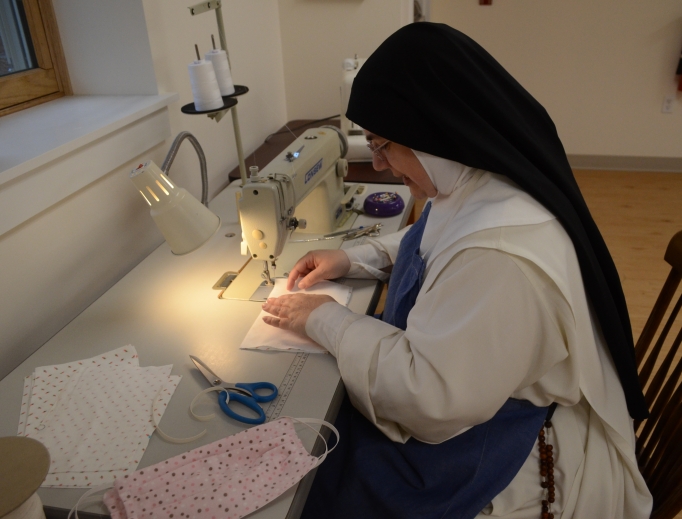
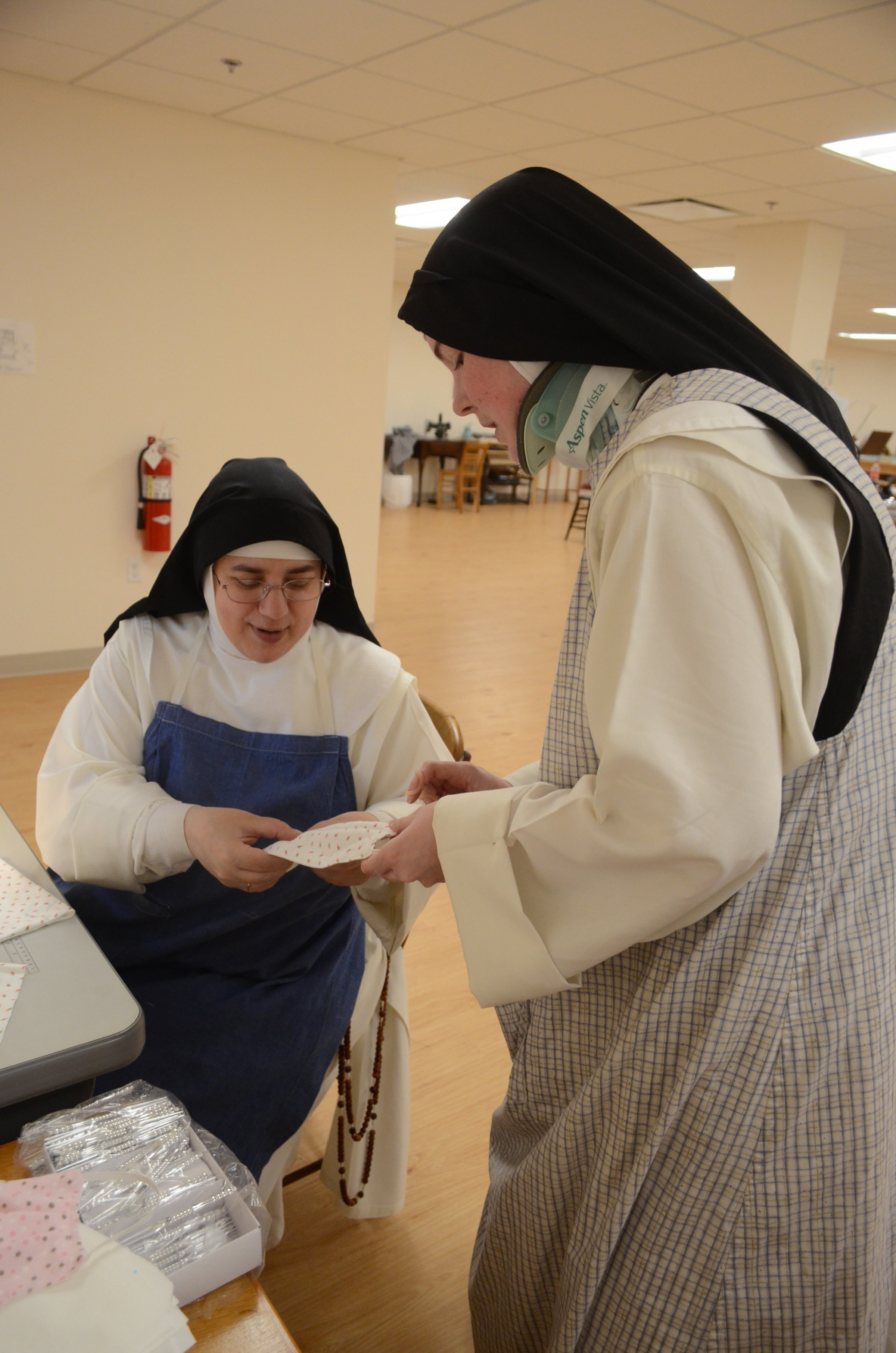
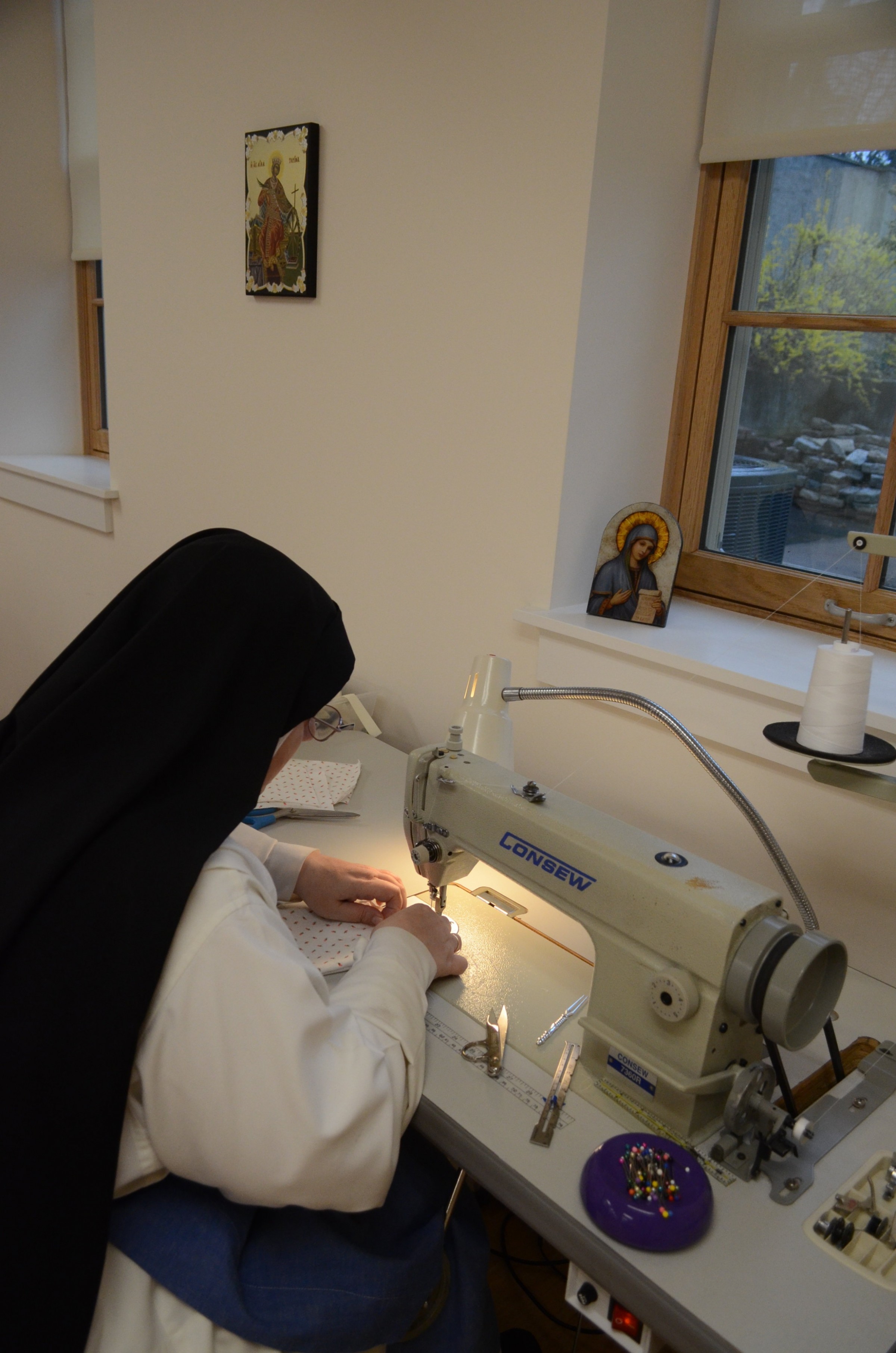
Help ‘Nextdoor’
When Colette Hagen, 60, of St. Paul, Minnesota, started seeing requests for masks three weeks ago, including from the organization running the hospice where she volunteers, she wanted to get involved and looked online for patterns.
“I just started making them for I didn’t know who,” Hagen said. “I didn’t know if I was going to donate them or use them for our family. … Before that I was making [jigsaw] puzzles, and I thought this would be a much better use of my time. I feel like I’m helping someone.”
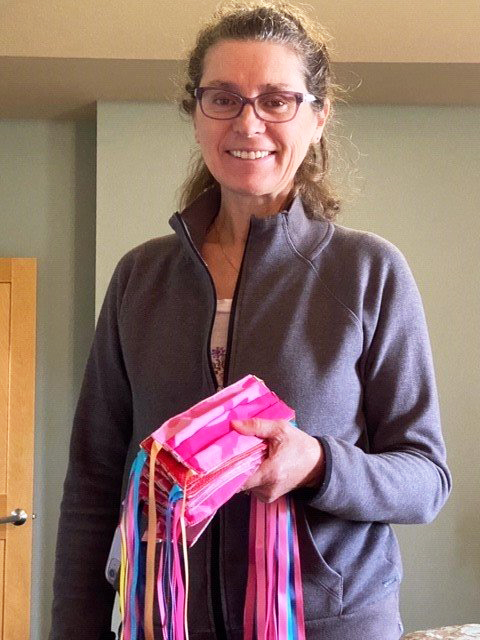
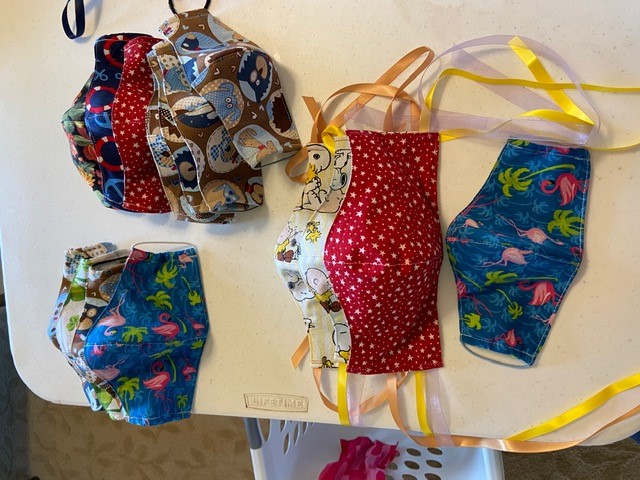
After making about 30 masks for family members and others using her own and other donated materials, Hagen fulfilled a request posted by a nursing-home employee on the neighborhood social-media app Nextdoor for 10 masks. She continues to make masks and would sew for health-care organizations to their specifications.
Elizabeth Moldenhauer’s neighbors in Shoreview, Minnesota, responded to her post asking for fabric on Nextdoor and dropped off more than enough for 20 masks for the senior-care organization where her husband (shown below) works.
“For me what was the beautiful thing about this whole process was the community coming together actively and saying, ‘Sure, I’ve got this, and I’ve got that’ and helping people,” said Moldenhauer, 69. “It is so similar to World War II and World War I and the ladies sewing and making things happen.”
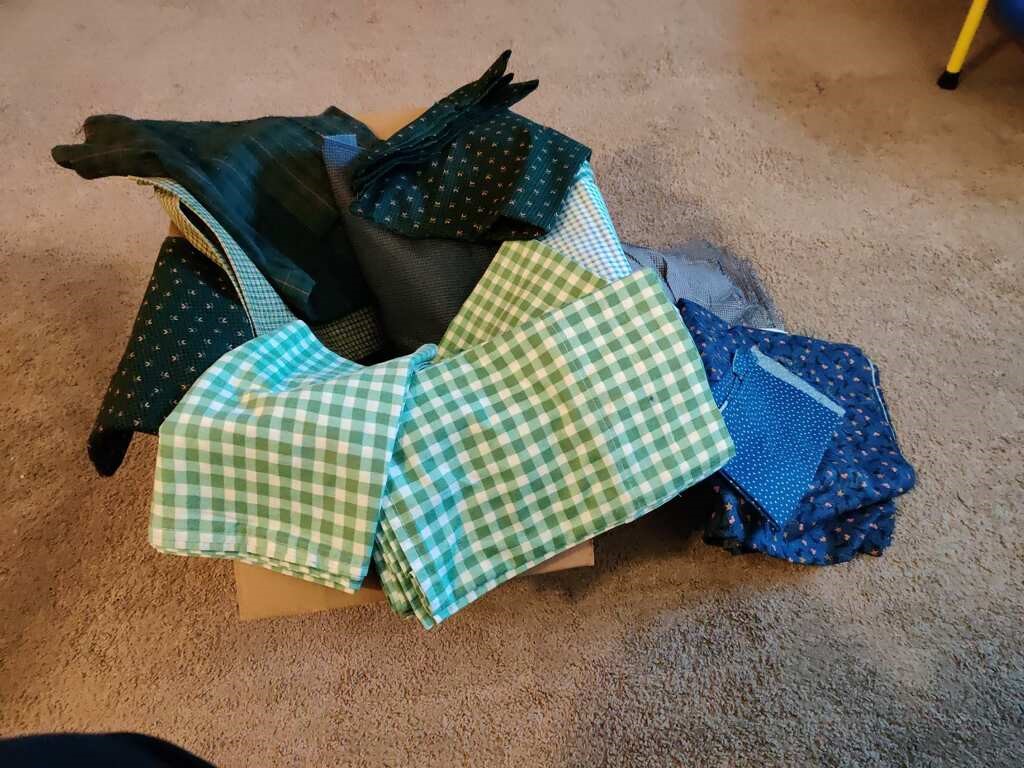
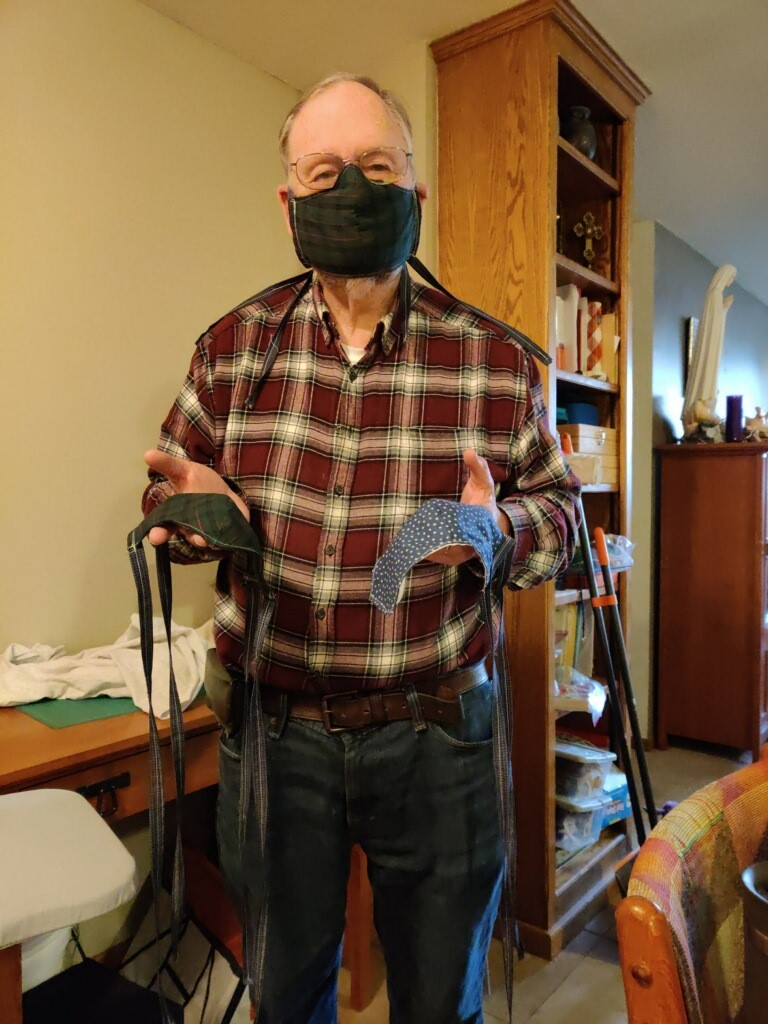
A Pattern of Compassion
Like Hagen, Moldenhauer used a pattern she found online. “They’re very easy to make,” said the retired textile artist who wants to make more masks when she’s not caring for her young grandson.
When a friend in Gloria Chynoweth’s craft group invited the Gainesville, Flordia, resident to make masks for a local hospital, she sewed 15 using the hospital’s pattern and fabric. Then she brought out her own fabric supply and has since made about 20 more.
“I started on this campaign to try and cover everybody I could think of,” said Chynoweth, 78. “The people, I thought, may not have any, for instance, for family.”
Chynoweth is self-isolating because she has a lung condition that puts her at a higher risk of COVID-19 complications, and making masks helps her feel like she’s helping.
“For me the coronavirus sounded — and is — so ugly and nasty,” she said. “It’s nice to feel like there’s something that I could do in this process. … It’s kind of the silver lining on a really bad situation.”
Like the other mask-makers, Chynoweth uses all cotton woven fabrics, such as quilter’s cotton. She said she makes straps out of seam binding or bias tape rather than elastic because some people are allergic to it.
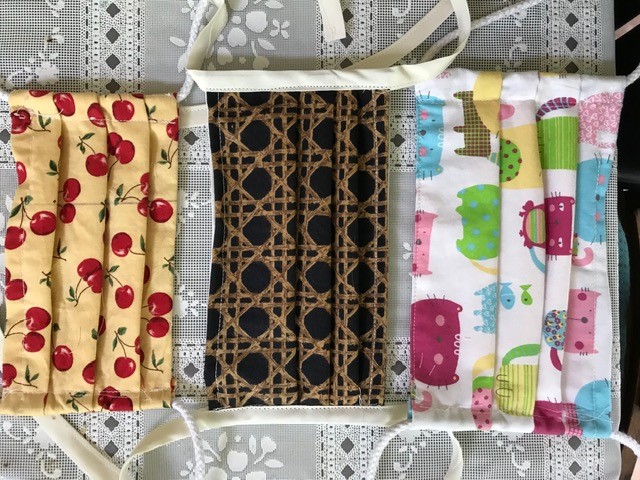
Carmelite Contribution
The Carmelite Sisters for the Aged and Infirm at the order’s motherhouse in Germantown, New York, have used both elastic and seam binding in some of the nearly 150 masks they’ve made since late March because one of the sisters donated a large quantity of it, along with fabric, for the effort, according to Carmelite Sister Patricia Margaret Rawdon.
More than half of the 27 sisters at the motherhouse are making masks for the other religious and staff at their 18 senior facilities in the United States and Ireland.
“The shortages are great, and the nursing homes are really feeling the pinch, so we are making them to go to our own homes,” she said.
The Carmelite sisters, as well as Hagen and Moldenhauer, create a pocket between the front and back layers of the mask to insert disposable filters that could even be a piece of a vacuum bag, Sister Patricia Margaret said.
Since many of the 18 Dominican sisters at Our Lady of the Rosary Monastery are making masks during their free time, they are encouraging each other, Sister Mary Catharine said. And their efforts are also strengthening their connection to the local community outside the monastery. Because they’re cloistered, they haven’t had a lot of contact with the outside community, even though their monastery is in the center of the city. Since they began making masks for a nearby hospital, more people recognize who they are and they feel they have more of a connection.
The community’s chaplain, retired Dominican Father Gregory Salomone, also began sewing masks in March while self-isolating to avoid the virus, she said.
At the time the Dominican sisters began making masks, they also fulfilled a request from New York Dominican friars for about 300 sacred oil “kits” for anointing the sick. They sent bags of oil-dipped cotton balls for the priests to bless. Their aptly named monastery mascot, Siena, is often around them, keeping an eye on the goings-on.
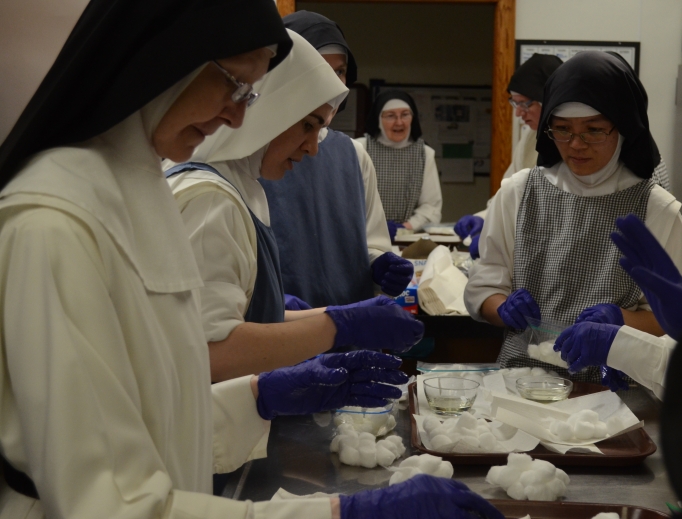
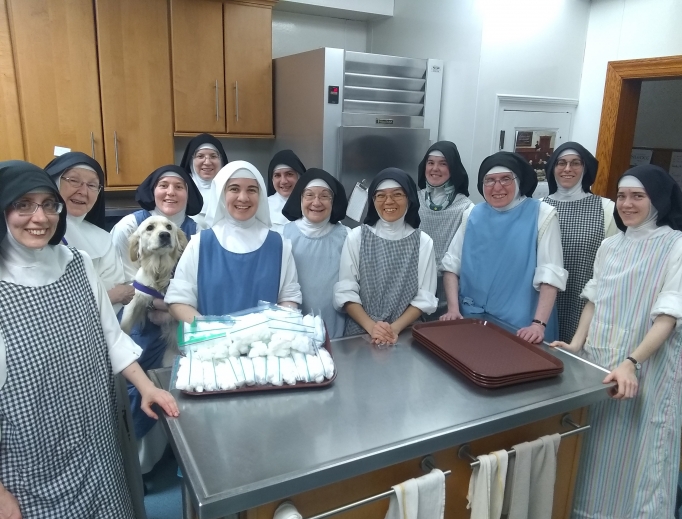
While Chynoweth prays for those wearing her masks, she also prays the masks do not harm. According to the Centers for Disease Control, homemade masks are not considered personal protective equipment because their capability to protect health-care personnel is unknown. The CDC recommends they be used in combination with a face shield covering the entire face.
The Spirit at Work
Chynoweth believes making masks is a work of mercy, not only for those who wear them, but because the work lets her be part of the solution.
“This is kind of like a prayer in motion,” she said. “Even if you may not think of it as a prayer, it is; it’s kind of doing something for others in the hopes that this is helping.”
Making masks also represents a sacrifice of time and effort that helps Hagen stay positive and other-centered.
“You pray that people are protected as you’re sewing, that it has a good effect for people and that we’ll get over this,” she said. “Instead of being worried or anxious, you just feel like doing something so you’re trying to help people and lift people up. It gets me out of myself and out of my thoughts to somebody else and the greater good.”
The work helps psychologically and spiritually because people want to contribute, Moldenhauer said. “When we can’t leave our homes if it isn’t prudent because of our age or whatever,” she said, “the opportunity of doing this is good.”
In the Dominican sisters’ life of prayer, mask-making itself is a prayer and an invitation from the Lord into something deeper, Sister Mary Catharine said.
It’s a spiritual exercise for the Carmelite sisters — a way to connect with those working at their homes and fulfill their community’s mission to care for those God gives them, Sister Patricia Margaret said.
The masks are a sign that good is coming from the pandemic, despite the tragedy, she said.
“You hear more and more of people helping each other and reaching out to see what they can do,” Sister Patricia Margaret said. “I think a lot of good is going to come from this, as difficult as it is.”
Susan Klemond writes from St. Paul, Minnesota.
- Keywords:
- coronavirus
- good news














